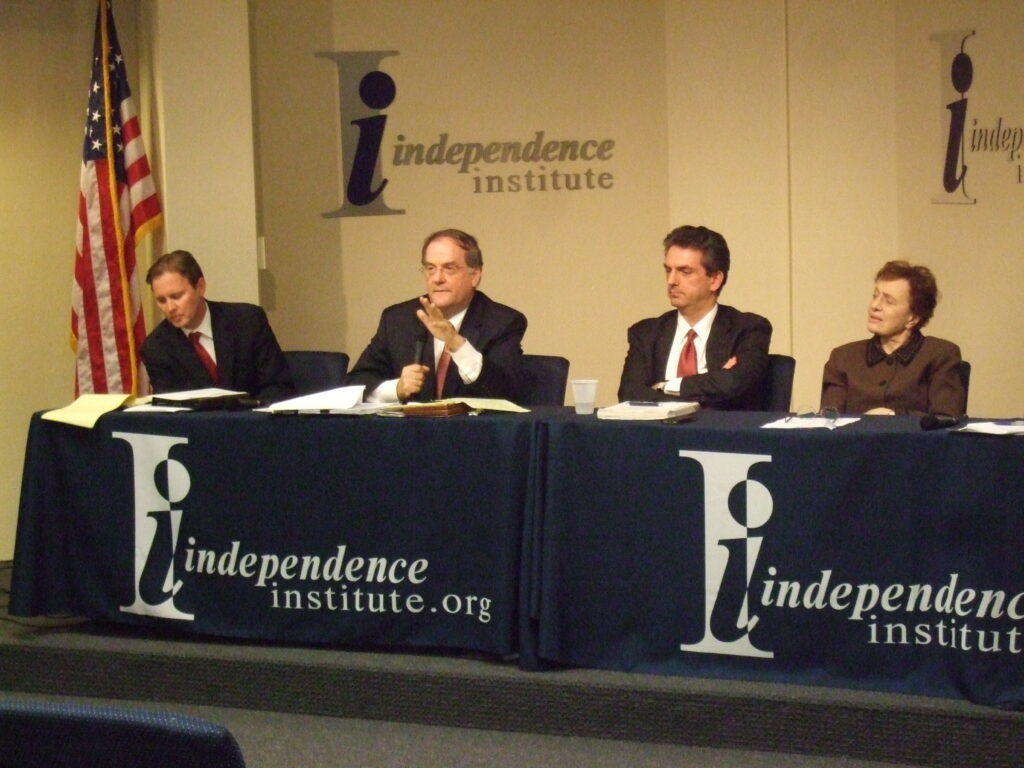Challenges of cost, control, and quality have caused some Colorado education leaders to take a second look at the state’s adoption of national academic standards.
A pair of December 6 meetings in Denver opened discussions regarding Common Core standards more than two years after state officials adopted them. The Colorado State Board of Education contemplated revisiting its August 2010 decision, hearing from 17 local educators and national critics.
The Boston-based Pioneer Institute for Public Policy also convened a panel of Common Core critics in the afternoon at the Independence Institute’s Denver offices.
“It’s a discussion that had never occurred but needed to occur,” said state board chairman Bob Schaffer (R-Fort Collins), one of the three members who dissented in 2010. “I hope it raises some critical questions about Colorado’s commitment to Common Core.”
Raising Questions
Federal grants pushed 45 states to adopt both the Common Core math and English language arts standards, which lay out what children should know in every grade.
One Common Core adoptee, Utah, formally withdrew from helping develop a set of tests related to the standards in August. Leaders in Indiana and South Carolina have also considered doing so.
Though not persuaded to step away, a pro-Common Core member of the Colorado State Board said some points raised by national critics merit further investigation.
“These folks raised some questions that I want to get answers to, especially whether the standards are really internationally benchmarked,” said Elaine Gantz-Berman (D-Denver).
Panelist Sandra Stotsky, a professor of education reform at the University of Arkansas, says her fellow panelists told the State Board the Common Core was not competitive with international standards. She told the Pioneer Institute audience Colorado’s previous English language arts standards were superior.
“Why did Colorado trade in a silk purse for a sow’s ear?” Stotsky asked the think tank audience.
Disputing Costs
But Michael Petrilli, executive vice president at the Thomas B. Fordham Institute, argues the new English standards are of equal quality and Common Core upgrades math education for Colorado.
Petrilli also said keeping the Core would give Colorado a clearer picture of school performance, greater access to digital learning innovation, and potential savings on new textbooks and other instructional materials.
“Any state not participating in the Common Core is going to miss out on this bonanza—most of it paid for by others,” Petrilli said.
Theodor Rebarber, founder and CEO of Accountability Works, sees the equation very differently. He argued signing on to the Common Core would lead states to take on significant additional costs.
“The proponents of Common Core have tried to create an aura of inevitability,” Rebarber said. “What it really means to implement Common Core is starting to sink in.”
Steering Ahead
A change of two seats on the state board since the original adoption has caused a slight shift in sentiment against the Common Core. Yet the state board may lack the authority to withdraw Colorado from the initiative.
In May the Colorado General Assembly approved bipartisan legislation binding the state to 22 others in the Partnership for Assessment of Readiness for College and Careers to design and implement a new set of tests tied to Core.
In the wake of the November elections, the Democratic Party controls the governor’s office and a majority in both legislative houses. Berman worried that changing course would disrupt ongoing local efforts to implement the Core in classrooms.
“We would create complete havoc in school districts to tell them just to go back to the old standards,” said Berman.
But some key education leaders still want to find a way to ensure Colorado doesn’t head down a path toward greater federal control.
“I would hope the discussion inspires a new direction of autonomy and independence toward higher standards,” Schaffer said.
Photo by Ben DeGrow for School Reform News. Left to right: Former Texas commissioner of education Robert Scott; Hoover Institution Research Fellow Dr. Bill Evers (speaking); AccountabilityWorks Founder & CEO Theodor Rebarber; University of Arkansas Professor of Education Reform Dr. Sandra Stotsky




